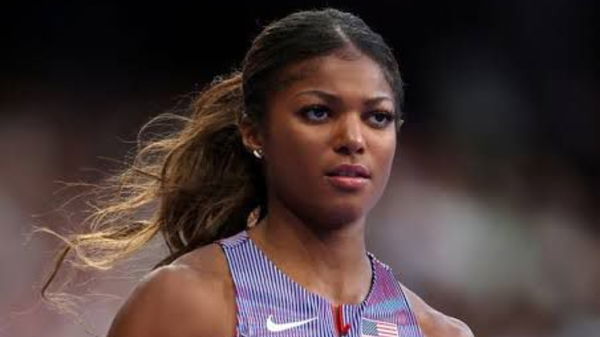

Gabby Thomas isn’t just a name you hear on the track—she’s a force of nature. A Harvard graduate and an Olympic champion, Thomas has spent her career shattering records and breaking barriers, both in sports and beyond. With a silver in the 200m (21.81 seconds) and a gold in the women’s 4x100m relay at the 2023 World Athletics Championships in Budapest, she’s proven her prowess time and again. But Thomas isn’t just about speed—she’s a trailblazer who’s advocated for equity, from volunteering at health clinics in Texas during the pandemic to pushing for women’s rights in track and field. Her resume speaks volumes, but it’s her voice that’s currently making waves off the track. What happens when a champion like Thomas faces the harsh glare of online hate?
On April 29, 2025, Gabby Thomas found herself in the crosshairs of online trolls, a place no athlete should ever be. A post by @TrackSpice on X shared a TikTok video of Thomas, captioned “Gabby Thomas claps back at haters,” with text overlay that reads, “You’re whitewashed” and “God forbid I don’t let my skin color dictate my personality & interests.” The accusation struck a nerve, prompting Thomas to take to X and address the unfair scrutiny Black women face in the public eye. The video, which has since sparked heated conversations, shows the Olympic champion visibly frustrated, her words a raw reflection of the constant judgment she endures. But how did Thomas respond to this wave of criticism, and what does it reveal about the challenges Black women face?
I know y’all posted this to be shady, but no other demographic is policed as heavily as black women. You’re either too ghetto or not ghetto enough. Either too extra or not extra enough. God forbid we just exist https://t.co/FUgf4iZN28
— Gabby Thomas (@itsgabbyt) April 29, 2025
ADVERTISEMENT
Article continues below this ad
In her poignant response on X, Thomas didn’t hold back, laying bare the exhaustion of being a Black woman under constant scrutiny. She wrote, “I know y’all posted this to be shady, but no other demographic is policed as heavily as black women… too ghetto or not ghetto enough, too extra or not extra enough… God forbid we just exist.” Her words hit hard, resonating with fans and athletes alike who’ve witnessed or experienced similar discrimination. Thomas’s emotional plea highlighted the impossible standards Black women are held to—standards that demand they fit into narrow cultural boxes while punishing them for stepping outside those lines. Her frustration is palpable, but what does Thomas’s experience tell us about the broader struggle for Black women in sports?
Track stars fight back as World Athletics tackles online abuse
Thomas’s ordeal isn’t an isolated incident—it’s a stark reminder of the systemic discrimination Black women face, especially in the high-stakes world of track and field. Thomas’s plea, “God forbid we just exist,” is a call to action, one that demands we rethink how we treat Black women in sports and beyond. Her courage in speaking out shines a light on the need for accountability, not just from trolls but from society as a whole
As track and field fans, we cheer for every sprint, jump, and throw, but the dark side of fandom—online abuse—has hit the sport hard. World Athletics is stepping up, offering year-round AI-driven social media protection for 25 athletes identified as prime targets after a four-year study of 1.4 million posts across two Olympics and two World Championships.
ADVERTISEMENT
Article continues below this ad
The numbers are grim: 1,258 abusive posts were reported, 254 accounts escalated, and two cases were sent to authorities. At Tokyo 2020, 63% of the abuse targeted two female athletes, with 29% sexist and 26% racist, while Paris 2024 saw two athletes take 82% of the hate, 18% of it racist. “Athlete welfare is at the very top of our priority list,” said World Athletics president Lord Coe, emphasizing tools to help stars fight back. But what’s driving this toxic wave, and how deep does it go?
What’s your perspective on:
Gabby Thomas: A trailblazer facing hate—why are Black women still under such intense scrutiny?
Have an interesting take?

ADVERTISEMENT
Article continues below this ad
The study reveals a chilling trend: abuse is evolving, with emojis increasingly “weaponized” to dodge platform rules, and at Budapest 2023, 35% of abuse was racist—a 12x spike from 2022—mostly on X, which hosted over 90% of detected hate. Many athletes, wary of attacks, post less during meets or manage comments tightly, yet the abuse often stems from their broader reputation, not just track results. Three of Budapest’s top five targeted athletes were also in Paris 2024’s top five, showing repeat victimization. World Athletics is fighting back with educational resources and plans to expand support in 2025, including athlete consultations for better protection. As fans, we want our heroes to shine—can the sport keep them safe online?
ADVERTISEMENT
ADVERTISEMENT
ADVERTISEMENT
ADVERTISEMENT


"Gabby Thomas: A trailblazer facing hate—why are Black women still under such intense scrutiny?"